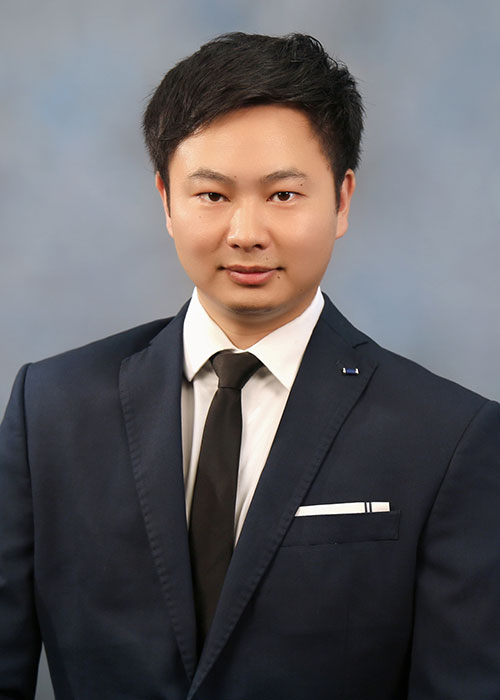One Engineer’s Quest to Remove the “Un” in “Reliable” Energy
In celebration of Asian American and Pacific Islander (AAPI) Heritage Month’s 2024 theme of “Advancing Leaders Through Innovation,” the Institute of Electrical and Electronics Engineers (IEEE) Power & Energy Society (PES) recognizes our AAPI members who hold leadership roles, are creating advancements in the field, and setting an example for the next generation of electrical engineers.
An insatiable curiosity related to energy “reliability” has been the underlying theme that has driven Junbo Zhao’s, Ph.D., Associate Director of Eversource Energy Center, Castleman Term Professor in Engineering Innovation at the University of Connecticut, and Research Scientist at the National Renewable Energy Laboratory (NREL), career forward.
From a child growing up in the Sichuan Providence of China who wanted to improve the reliability of the electrical grid so he could play his favorite video games without interruption, to his current work with emerging and innovative grid modernization technologies in the face of climate change and grid decarbonization goals, Junbo has always endeavored to find effective solutions that would make the electrical system more reliable, affordable, and resilient.
After earning a B.S. from Southwest Jiaotong University, Junbo was accepted to Virginia Tech’s power and energy Ph.D. program, where he studied under IEEE Life Fellow, Professor Lamine Mili.
It was at Virginia Tech that Junbo learned about IEEE PES and became a student member. Since then, his involvement has been extensive and has included being the chair of the IEEE Task Force on Power System Dynamic State and Parameter Estimation and the IEEE Task Force on Cyber-Physical Interdependency for Power System Operation and Control; co-chair of the IEEE Working Group on Power System Static and Dynamic State Estimation; founding chair of IEEE Working Group on Distribution System BTM DERs: Visibility, Analytics and Control; and the secretary of the IEEE PES Distribution System Analysis Subcommittee, the technical committee program chair of IEEE PES’ Renewable Systems Integration Coordinating Committee, etc.
“IEEE PES allows everyone to work together collaboratively and gives people opportunities they cannot find elsewhere,” he said. “I was given opportunities to lead task forces and working groups even before I got my Ph.D., and through that I was able to meet people and receive recognition for my work that increased my confidence. I felt valued, and now it is time to pay it back and work with the next generation to open the same kinds of doors that were opened to me.”
During the course of his career, Junbo has been the recipient of several best paper awards at IEEE PES meetings and conferences; been named a Top 3 Associate Editor of IEEE Transactions Smart Grid in 2020; and also received a 2020 and 2022 IEEE PES Chapter Outstanding Engineer Award, the 2021 and 2022 Best Papers of IEEE Transactions on Power Systems, the 2021 IEEE PES Outstanding Volunteer Award, the 2022 Outstanding Associate Editor of IEEE Transactions on Power Systems, the 2022 IEEE PES Technical Committee Working Group Recognition Award for Outstanding Technical Report; as well as a 2022 IEEE PES Outstanding Young Engineer Award (Society Level), a 2023 IEEE PES Technical Committee Prize Paper Award, and a 2023 IEEE PES Working Group Recognition Award for Outstanding Technical Report (Society Level). His 2022 IEEE PES Outstanding Young Engineer Award was earned largely for his contributions in robust dynamic state and parameter estimation, physics-informed learning and uncertainty quantification, and cybersecurity for power systems.
“Robust estimation, physics-informed learning and analytics, and cybersecurity are the three major pillars I’m still developing and what I am most proud to have worked on to date,” he said. “We’ve seen some practical applications already in US and these initiatives are poised to make a significant contribution elsewhere in time.”
Making significant contributions that matter is something Junbo is working to instill in his students in his role as mentor.
“I recognize that my students are on an adventures journey, and it is my responsibility to guide them along the way,” he explained. “In the beginning, they need a lot of guidance but one of the most important lessons I learned is that they need to be able to do things on their own as independent researchers. Eventually, you witness them beginning to stand on their own and the day will come when they know more about their research subjects than I do.”
When asked what led him to go into academia, Junbo highlighted that while he finds the challenge of solving complex problems invigorating, his greatest motivation stems from sharing his knowledge with young engineers and colleagues in the power engineering field. This passion for mentorship and knowledge exchange is what truly drives him in his work.
“I realized I couldn’t work in a vacuum,” he said. “I believe the most effective means to contribute to the education of future engineers is by becoming a professor. While being an engineer allows for focus on solving specific problems, I aspire to make a broader impact on society. This value drives my desire to educate and empower the next generation, equipping them with the knowledge and skills to address complex challenges and advance society as a whole.”
When asked if he thought he’d be where he is today. Junbo responded, “I’ve frequently shared with my wife the belief that without my role as a professor, I might not have achieved the level of success I enjoy today. Similarly, my deep involvement with PES has played a crucial role in shaping my current path. I’m grateful for the journey thus far and cherish my collaboration with PES. Looking ahead, I eagerly anticipate many more years of continued engagement and contribution.”


